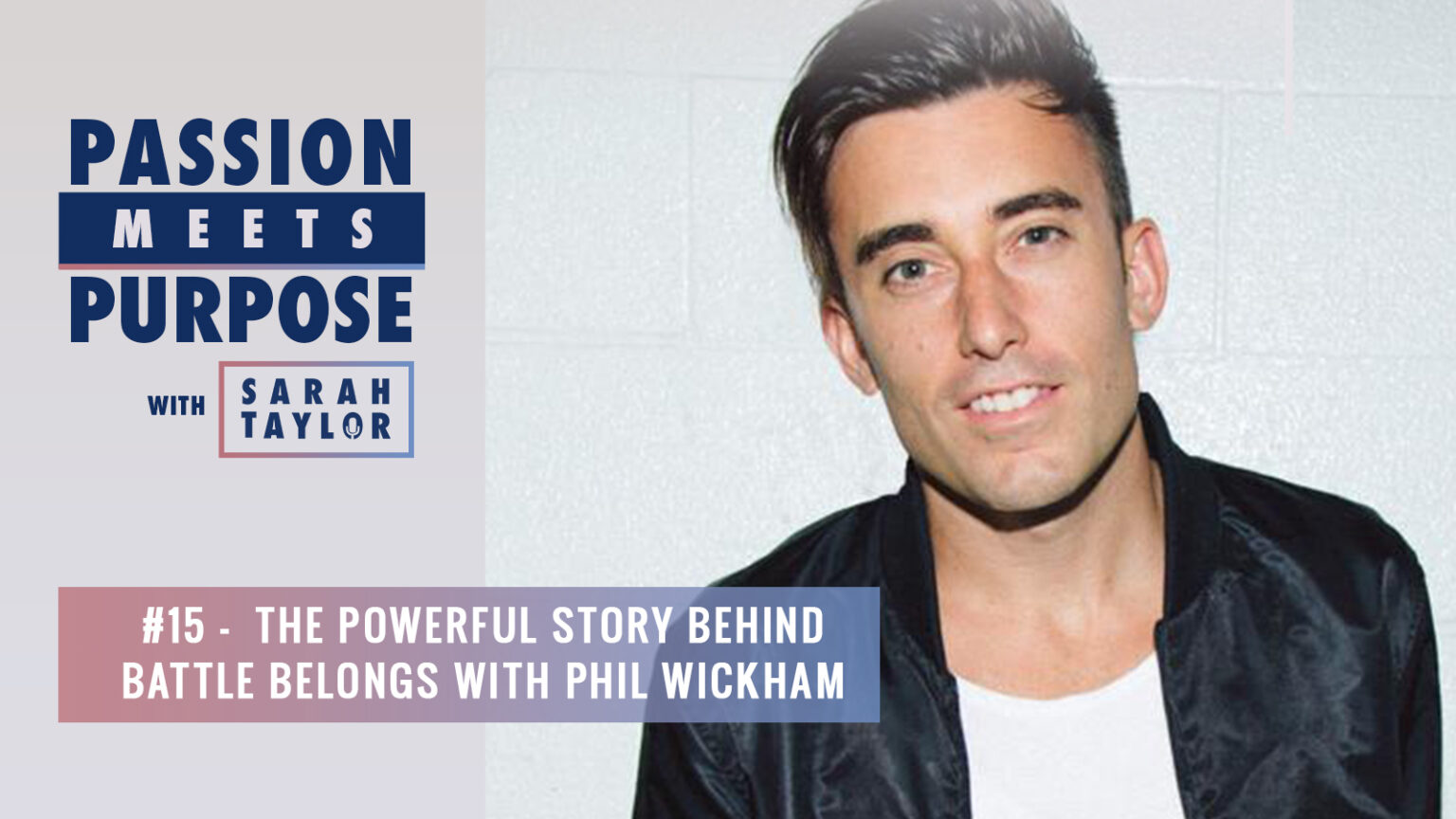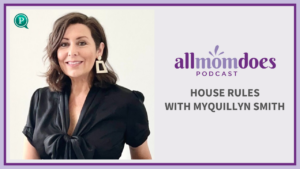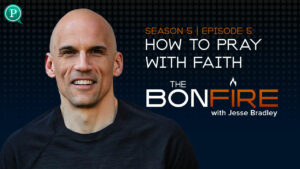This laid back father of four shows you behind-the-scenes where he writes his songs, talks about camping with his daughters in a 40-year-old tent, the unique traits he sees in each of his kids, the man who spoke into his gift of music when Phil was just a teen, why being a Worship Leader actually means you put yourself last, and he talks about the powerful story behind his song “Battle Belongs!”
Interview Links:
- Follow Phil Wickham Online | Instagram |
- Watch the acoustic version of “Battle Belongs”
Transcription:
[00:00:00] Sarah Taylor: What if you could spend the majority of your hours each day doing something, you love something you feel like you were created to do. It just comes naturally. That’s your passion. And then what if you had the deep satisfaction of knowing you were giving back to the world of watching others benefit from what you create, that’s your purpose!
Welcome to the Passion Meets Purpose Podcast. I’m Sarah Taylor. And of course our thanks to Northwest university for making this podcast possible. We’re thrilled that you are here. Singer songwriter, Phil Wickham joining us today. Now Phil actually joins us from a little room above his garage, where he has escaped his kids for a while to write some songs.
How old are your kids?
[00:00:44] Phil Wickham: It’s easy because they’re all in a place where it’s all ages right now. So 9, 7, 5, and three. And that would be Mabel, Lottie and Henry.
[00:00:51] Sarah Taylor: girls and a boy. Okay. That is just the name lottery, right?
[00:00:54] Phil Wickham: Good name. Good. Name’s Penelope. She’s a strong, she’s really good. She’s nine years old, but she just like audition.
She’s been dancing since she was like two, you know, but she just did her auditions for the competition team and she like nailed she’s going to be on it in a tat solo she’s in a ballet trio thing. She’s in a jazz thing. So she she’s killing it at dance. Mabel’s. Nan. She’s like this brilliant little book, reading artists.
She likes, she she’s like a little elf floating around the house. It’s like, what are you going to doing right now? I don’t even know what she’s up to. She just kind of like, I see her, her buzzy head just blowing around and Lottie’s the joker or Sheila. She’s like, if there’s a person’s space, if there’s a five-year-old space next to the term, Netflix and chill, then ADI would be right.
Yeah. She just, she’s such a professional relaxer. And, uh, and then Henry I’m curious, uh, Henry is three. He just wants to be Spiderman and hang out. And I go out on runs. You know, we, we live fairly close to the coast, so I’ll bring my to the jog stroller out. It’s like a favorite thing. Like getting a stroller, watching a train going by.
Pretend he’s flying in the store and he’s just, he’s such a boy, he’s a boy all the way through. And, um, which you know right now is a little bit crazy, cause he’s a three-year-old, but I’m, I’m excited for what that means.
[00:02:12] Sarah Taylor: I love it because I can just, the minute you start naming them and talking about what makes them individually unique, I see all your dad pride pop out. And I love it because it’s like, I know. And it’s, we could sit here and talk about your catalog of music, the songs you’ve written and all of that. And we will, but I just, I like how you light up when you talk about your kids.
[00:02:29] Phil Wickham: Well, they’re amazing, but also they’re so annoying. And so I, um, you know what I mean, by knowing I just need, it’s just constant.
And so anytime I just feel like I’ve worked so much harder at being a dad. And then, then being a musician, like it’s been it’s, it’s so much more work. Do you know what I mean? Like daily in there or else if you’re not daily in it and being so intentional, then you go to bed at night thinking like, oh, I messed up.
You know what I mean? It’s like that dad, until you could have been more patient then, or I wish I would’ve just gotten off the phone and been there for him at that moment, you know? With music. It’s like, this is it’s fun. And it’s, I mean, there’s moments, but it’s work. You know, it’s like some of the long flights, not this year, but in times, you know, the long flights travel being away from home, but this a lot of hurry up and wait and what I do, you know, and there’s a lot of like, you know, writing a song it’s fun for me.
And, uh, kids are fun, but also probably more work than they are fun. And so maybe that’s why it’s like, Hey, you’re becoming a cool little human. And this is like pulling an investment from your mom and I showing you what it means to be good. You know, I think maybe that’s a big part of it is it, it takes up so much of my brain space and my energy that it’s like, yes, I’m proud of this.
Cause it’s been a lot of work, you know,
[00:03:50] Sarah Taylor: I saw an Instagram post from a few months ago. You took them fishing.
[00:03:53] Phil Wickham: I took my two oldest. Um, so yeah, the two younger, because it’s like a seven hour drive. We went up to. East side. What are those? Oh my goodness. The big, huge mountain range in California where I live.
I can’t even think the same. Uh, you guys are gonna laugh at me. I can’t, I can’t think of what it, but it’s a, it’s like where Mount Whitney is a huge mountain. Um, we’re up about 9,000 feet, the camped out intense for about four nights. So, but even the drive seven hour drive with someone under six years old, you’re asking.
You’re asking for it. And so I took my two oldest who are nine seven, and man, I it’s going to be a yearly thing. What like no phone, reception, beautiful man, beautiful lake, um, Creek running down through the camp site. I mean, it was just like, Uh, Nate, especially when we went, um, it was kind of like pretty locked down, but you’re in Seattle, too.
So on the west coast pretty locked down when we went and, uh, so to go up there and get away from just, just being in a house all the time was awesome.
[00:04:51] Sarah Taylor: They bring up memories from it already. What do they, what did they talk about? What stood out to you.
[00:04:57] Phil Wickham: I think sleeping in the tent was a big deal. You know what I mean?
Cause they had never done that before. And we were in a really old tent. It was tent that my cause I’m never, I’m not a camper. I’m like, I mean, I don’t know if you can tell I’m very, like, I’m not even like even grown up by the beach, my whole life in San Diego. But if I could choose, I’d rather be at the coffee shop, overlooking the beach than actually in the sand and getting my, you know what I mean?
Like I’m like that I’m like, I’ll stay clean kind of guy. And so I’m so gone camping. I’m like, man, I, I know this is going to be a great investment with my kids, but it’s going to be fun. And it was so, I mean, I’m going to do, I loved it. It was so fun, but we were in this tent that my father-in-law, so I went up with my father-in-law.
He’s been going to this campsite since he. My kid’s age. And then he brought my wife up there and her brother and sister. And so it was like, there’s this family tradition with a family going up for like 50 years. And so I, we slept in the same tent that he and my mother-in-law stepped in right up to, they got married.
So it’s like a 40 year old tent and a very rickety, like if we had any weather, like we would be using the tent as a sleeping bag. Cause it would be on top of us, you know, like one gust of wind and the whole tent was like, like so crazy around this. And, uh, but we made it fun, you know, like we were just, uh, we wake up, what does that?
I it’s like, oh, it’s just the temp, you know? Um, but they would laugh and we’d go back to sleep. So I think was being cozy in there and we read through books every night. And so like having the lantern and reading through books and it’s a great memory.
[00:06:23] Sarah Taylor: I love it. So we were talking a bit about how you notice unique things about each of your four kids, right.
And who they’re becoming when you were young. And began to realize you had this musical gifting. Was it your parents or who was it in your life that really recognized and nurtured it? And it was sort of a mild marking moment for you with music?
[00:06:44] Phil Wickham: Well, I grew up in a family, uh, really S uh, I’m so blessed.
My parents are still together. They’re still, my dad’s still on staff as a worship pastor at a church. He’s been on staff at churches is the worst split in my whole life. And so I grew up with music and Jesus. And, and, uh, and so when we moved from, uh, from one area of the county to another kind of had my friends weren’t close by.
So I pick up a guitar. My dad taught me how to play. That was when I was, uh, I must’ve been 13, maybe 12, 12 years old, and I loved it right away, but I, for sure didn’t think this is what, like I had a need to do for the next three decades. But then, and then as I just, I played so much in the way I learned to guitar was through the learning worship song.
Cause that those are all the songs I knew from my parents playing in them worship songs. So I had no idea. I was like worship leader in training. I was just loving guitar and those were the only core charts we had in the house. And then my youth pastor in Lamson and sheet. He found out, um, because him and my dad were on staff at the church together.
He found out I was going to have like a tar. I could sing a little bit. So he threw me on stage, but still, I didn’t really, I, it was still, this felt like, wow, what a cool thing I get to do once in a while. And I would say it was in high school. Um, there was a man, there’s a man named Joey bran. Who’s a, he’s now a pastor of a church, uh, in, in, um, orange county.
But he’s, he was one of these guys that like, he, he won this surf competition called the pipeline masters back in the eighties. Um, which is a huge, if that’s in Hawaii, it’s a big, it’s a big surf competition. You’re on the field, on the front cover of surfer magazine. If you win that. So in the eighties, he was this huge surfer and then had this huge come to G like he was a party animal.
Whole thing came to Jesus, became an evangelist, started a. I’m a young adult worship night Bible teaching night at this church in north county. And he found me in my little youth group and he said, Hey, like, I think you got something special. Can you, will you come up and be one of the leaders for this? Um, and it’s interesting cause there’s other leaders too, that like Jeremy camp wisdom around Southern California, he would lead for this thing and other guys too.
And, uh, and it grew, it grew to this from like, I don’t know, in a small room with. I don’t know, 50 college kids to the full, big sanctuary packed with 2,500 young people singing for like an hour and a half. Um, and, uh, and I started writing songs. That’s when I started writing songs for that thing, that, that specific, uh, ministry to sing.
And it was in that time through, I think through Joey’s encouragement, he had some words just like straight from the Lord. I still remember some really specific things about writing songs that are going to be translated into other. Other country languages, other languages, and to being more severe, not just for one church, but for churches at large, in America, big, he would say big things like that to me.
And I’d just be like, Joey, like I just, like, you’re such a hype man. Like give me a break, you know? And, and that’s, that’s crazy. Cause it’s kind of become what’s happened. These songs that I write for my church and gone on to become songs that churches all over the world sing. And it’s just like, now that it’s, it’s like, whoa, that happened.
Yeah. I don’t say it. I don’t say it. It’s like, it’s not a false thing. It’s so much more than I could have ever thought or tried to achieve it. Just so evidently the grace of God, working through a guy who really messes up a lot. Um, but I’m willing. I just, I love writing songs for my church and it’s amazing that he songs go on.
So I would say around 16, 17 as I was writing songs, Going into other churches. I was thinking, well, this is something I want to chase for as long as I can.
[00:10:13] Sarah Taylor: So good. Oh, we’ve got so much more coming up with Phil Wickham, including how he’s going to talk about how, if you’re just starting out at something it’s okay to be terrible for awhile.
Um, also I want to thank Northwest university for making this entire podcast possible. They offer undergraduate and graduate programs in person and online. And throughout this whole pandemic, they’ve been able to maintain a vibrant campus life. Like with CDC approved teaching methods called high flex.
They are certainly pioneers and visionaries. They’re prepared to help people pursue their dreams, even in the midst of the pandemic. And they can help you to. I have several friends who’ve attended Northwest university. I have friends that have done all online learning their professors are excellent and they equip students to be effective leaders.
They’ve been doing this since 1934. Your future isn’t canceled. You can find out [email protected]. Okay. Now back with Phil Wickham. Now we were talking about his experience at like 17 years old and just all the practice he got to put in Phil. I’m so curious. What would your advice be to someone right now?
Who’s very inspired by your journey. Um, but they’re still very much an amateur when it comes to what they’re passionate about.
[00:11:31] Phil Wickham: This from my own experiences. I’m not saying I I’m, I’m, I’m better Christian because this aura, I was not that this is the only way to do things. Um, but I never had dreams as far as I was young.
I mean, I had dreams about like, Ooh, that’d be cool. One day I could do that. It wasn’t like the end goal. Um, and, and whenever it was, I had people around me kind of being like, Hey, don’t, don’t lose sight of how special this is right now. You’ve got 20 high school kids in this home fellowship that one to meet with Jesus and you get to lead up, you know?
And so I think a huge thing to see, to let God and to trust in God’s timing and to let him open the doors when, when it’s a right time to not try to push through anything, to not get depressed. Man. I was started when I was 16 and I’m 21 now. And I’m still not signed. I’m still not on tour Hillsong United, you know?
Um, for me, I certainly wish when I was 12. And then it took, it was not till 12 years later. Right. Assigned, you know, not till I was 22, I signed with a record label. But even then it probably wasn’t until I was 24 until I actually like moved out of my parents out. Do you know what I mean? Like I was, I was still just trying to make it work.
And then when I was maybe 27, the song, this amazing grace kind of really connected. And that was probably when things really changed on a, on a different level for me, but that’s a long time, but I would just say, there’s this thing that my pastor said to me forever ago, when, because I’m never thinking like you would ask him, what do you think I should do?
And I’ve got these songs out. Maybe I should record on them. And he just said, this, this phrase is it’s called bloom where you’re planted. And that means just set, get your boots in where ever God has you and the people that God have in front of you and the thing you have to do in your heart. Like don’t kind of look way outside all of that.
So how do I get there? But say, okay, what’s right in front of me, how do I love people and serve God with the thing God has put in my heart to do? You know? And, and so all you can do is what’s in front of you. It’s like, okay, well, my church I’m at right now, it’s different in lots of states. We’re in 2020, but speaking as a whole, um, in fact, Things are going to open up in the future.
So I’m sure you’re probably watching the future. You know, your church I’m sure has two or three or four or five ministries that would love a young worship leader to come in with a willing, humble spirit, ready to serve, you know, whether it’s like the drug and alcohol ministry or the high school or the kids area, or maybe there’s things that they needed a backup guitar up in the sanctuary.
And so I guess I’m saying it’s like be absolutely a hundred percent ready to sell. Being a worship leader is about putting your artistry and yourself and your own ambitions and desires way behind this idea of serving the church. You know, if you want to be a singer songwriter, then like you’re saying, I want to express my art and what God has put on me.
I want people to see that that’s how I’m going to worship God. But if you’re saying I want to be a worship leader, I want to do it like Hillsong night is Bethel and Chris Tomlin. And then what you’re really saying is I want to put myself last and just be available and try to do it with as much excellence as possible.
And, uh, and it’s amazing as you become excellent in a thing in a place God has given you. I assure you if you are supposed to be other places in that God will open up doors. Wow.
[00:14:44] Sarah Taylor: That’s powerful. I want to put myself last is what you’re really saying.
[00:14:47] Phil Wickham: That’s what I’ve been really focused on lately is as a worship.
You really stopped becoming an artist first and you become a, you become a minister first, which means to serve, which means to how do I love the people in front of me the best, even if it means playing songs. I don’t love, even if it means having a band, that sounds not as cool as I would like. Even if it means slowing everything down or saying, okay, we can’t have drums because this is a big deal that we have drums in here.
They’re too loud. Like we want through drums. Like even if I really want, you know what I mean? It’s just, how do I serve so that people can meet Jesus, not. Show them what cool music is or how do I show them how great I can sing? It’s like, all of that is behind. How do I bring these people to the feet of Jesus, with what God has equipped me with?
You know? And, and that’s, that’s the mindset. But I think if you learn that the quicker you learn that I think the quicker, more doors will open for you.
[00:15:42] Sarah Taylor: Well, speaking of that posture of your heart, why don’t you talk to us about battle belongs?
[00:15:47] Phil Wickham: Yeah. Um, man, I, I love this song. Uh, I love it. Just, it really just pumped my spirit.
Uh, every time I sing it, it’s been kind of like my little, my little personal spiritual battle cry over the last year or so. Uh, it was written in 2019 and it began as this funny, um, didn’t come out of some really intense moment in my life. Uh, it came that I wasn’t, I was based on my buddy, Brian Johnson is at that bone.
He’s saying, Hey man, I got an idea for a song. And they’re telling he’s like, well, my, my buddy got a tattoo and it says when I fight or it says, I fight on Monday. And I’m like, that’s amazing. Like we gotta use that. He’s like, yeah. He said we can’t, we could totally use it. Of course just kind of spilled out.
Um, and I just thought, and I immediately thought, wow, there’s something special in this declaration. Um, and when we got, we got to like treat the versa, we’ve got to treat it really, really well. Cause I think there’s something special to be said here. And so I started looking over scriptures, uh, all the battles that it talks about being fought in the old Testament, you know, And I, I landed on this scripture in second Chronicles, 20, and as I read it, I just thought, oh yeah, I love this story.
I haven’t thought about it in so long because it speaks, it speaks to all of us, but it also has a really special message for the worship leader, because it shows you how worship can be a weapon against the darkness. But it’s this story. Of when these several nations have amassed this huge army to come against the people of God, the people of Judah and the king of Judah at the time, his name is Joseph that.
And when he learns about this conglomeration of nations that have created this huge army, he, I mean, it is terrifying because they’re, they’re violent. Um, and there, it’s impossible without the help of God for anybody to survive this attack. I mean, it’s, it’s just a hundred to one kind of situation. And since your hotspot goes before the Lord and says, and Rema goes and appeals to God’s grace and his promises that you said this, you said this, you’ve done this in the past.
You’ve done this the past. So we come to you because you are the only one that can help us. And I love the end of that prayer. I mean, it’s, it reminds me of myself. The end of the prayer says we do not know what to do, but our eyes are on you. You know? Like we, we have no with no plan. There’s no like, cause it’s.
Helpless. And, uh, and then God speaks through the leaf. This Levi’s man, God speaks to this man. And it says this. He says, this is what the Lord says today. You will not have to fight in this battle stand firm and hold your position and see the salvation of the Lord on your behalf. I mean, how amazing we read that and think, oh, the Lord team.
But then you put yourself in their situation. That was a man speaking the word of the Lord, but it’s not like it had happened yet. There was still an army coming. It took a huge amount of faith to believe in that promise and to trust God that he really didn’t speak. And I can imagine that situation to go.
Okay, cool. Hopefully God is wanting to do that. Let’s get a plan together anyway, like let’s still put our strongest men up front. Let’s still, you know, but what they did, they leaned into the faithfulness of that promise. And what Jehosaphat’s said is like, okay, because the Lord said we will not fight. We will not fight instead we will worship.
And so instead of sitting the strongest military in the front lines, they have all their priests act as if they were about to walk into the presence of God. They put on the holiest robes, clean themselves, all the rituals they needed to do. And all the priests and the worship leaders went before the huge army and started singing.
Holy is the Lord for his steadfast love endures forever. And as they worshiped in the face of the enemy, God moved and there was this confusion and the other, um, there’s confusion in the camp would be enemy army coming their way. And they all sort of fighting against each other and they were routing.
And God did this incredible miraculous thing about these people. And, uh, and so the several things we can take from that, this idea that God is still doing that for us today, too. I would say that would be our prayer. If we really were honest with ourselves, the enemy of sin and death is something we can not fight against it as inevitable.
Like we will always be sinners in need of a savior, and we’ll always a hundred percent. All of us are going to die, you know, and Jesus can’t. Um, and he, in a way said the same thing, stand firm, hold your position and see the salvation of the Lord on your behalf. And Jesus showed us salvation load on the cross and through the empty grave so that we can live in victory and hope today.
Um, but also for us, it’s not just sitting back and saying, well, Jesus did it all. I can do whatever I want, but it’s going to take faith in our part to step into a life that reflects what Jesus has done for us Stephens, who lacked that believes what he has done and believes that the kingdom of heaven is now.
That’s my, that’s the whole story I talked for a long time, but I, I love that story. I love what it means for us, Phil,
[00:20:21] Sarah Taylor: Thank you for your time. Let’s do this again and just really appreciate every, everything that you shared with us today. So on behalf of the station, thank you so much.
[00:20:32] Phil Wickham: Thank you, Sarah. So good to be with you guys and praying for safety and health and blessing for y’all.
[00:20:37] Sarah Taylor: Phil Wickham.
What a gift. There is such power when you share your story. I hope that in listening with Phil, you find exactly that, that just talking about your journey with someone else about the things that light. The way that, um, it’s all kind of come about the good and the bad stuff. I think there’s just something pretty magnificent.
This is why we do the whole podcast. In fact, I would love to hear your story. It’s not just singer songwriters or Olympic gold medalists or Grammy award winners. No, it’s every single one of us. Um, talking about the talents that we have quite often stemming from childhood, and then the way we give back to the world.
So reach out if you want to be on the pod cast or want to hear somebody, um, we’ve made it real easy. The email address is [email protected]. That’s how you give us your feedback, your comments, and your guest ideas [email protected]. Thanks again, of course, to Northwest university. And, uh, thank you for listening.
You can find us wherever you get your podcasts. Clearly you already figured that part out. And we release new episodes every two weeks on Wednesdays. And so click the follow button or subscribe. I’m still learning what one it is. Thanks. We’ll see you in two weeks.








